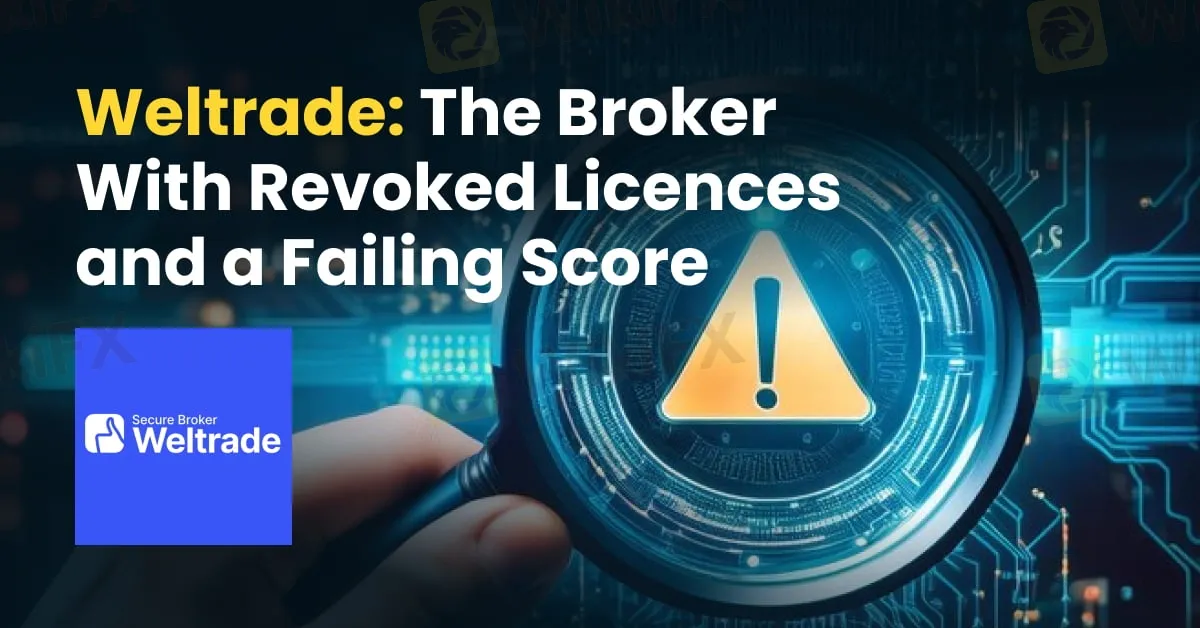Weltrade: The Broker With Revoked Licences and a Failing Score
Abstract:With revoked licences, misleading regulatory claims, and a dangerously low WikiScore, Weltrade may be exposing unsuspecting traders to far more risk than they realise. Here’s what every investor needs to know.

Weltrade, a forex and CFD broker operating globally, has recently come under scrutiny for a series of troubling regulatory issues that raise serious concerns about its credibility and transparency. Originally registered in Saint Vincent and the Grenadines, Weltrade offers trading in forex, metals, indices, commodities, and stock CFDs. Despite its widespread presence, the broker has received a dismal WikiScore of just 2.50 out of 10, casting doubt on its trustworthiness in the financial markets.

Though the company claims to be regulated by the Belarusian NBRB, Belize FSC, and South Africa‘s FSCA, further investigation reveals that these regulatory statuses are far from standard. In fact, multiple authoritative bodies have raised red flags regarding Weltrade’s operations.
One of the most significant concerns is that the Securities Commission Malaysia has officially disclosed Weltrade, placing it on an alert list for potential risks to investors. Such disclosures typically indicate regulatory breaches or suspicious practices that merit caution.

Further investigations have revealed that the Belize Financial Services Commission (FSC), which had once granted Weltrade a licence under the number IFSC/60/350/TS/17, has revoked the licence. Offshore regulations like Belizes are already considered to offer weaker oversight, but the revocation adds a further layer of risk.

Similarly, the Belarus NBRB, which had registered Weltrade under licence number 192727233, has also revoked its regulatory approval. This development highlights serious compliance issues that traders cannot afford to ignore.

Adding to these concerns is the broker‘s presence in South Africa, where it claims to operate under the Financial Sector Conduct Authority (FSCA) with licence number 50691. However, it has been confirmed that Weltrade’s activities exceed the scope allowed under this regulation, suggesting that the broker may be operating in violation of local financial laws.

In addition, the broker reportedly holds a Non-Forex licence from the US National Futures Association (NFA) under UNFX, which does not cover the full range of services it appears to offer. This gap between the claimed regulatory coverage and actual authorised activities presents another layer of risk for unsuspecting traders.

Taken together, these factors paint a concerning picture. A low WikiScore, combined with revoked licences, abnormal regulatory statuses, and misleading compliance claims, makes Weltrade a high-risk broker in the eyes of industry observers.
Investors are strongly advised to exercise extreme caution and conduct thorough due diligence before engaging with Weltrade.

Read more

Boosted by U.S. CPI, Yen May Rise Again
Lower-than-expected U.S. CPI data has fueled rate-cut expectations, weakening the dollar and renewing investor interest in the yen as a safe-haven currency.

Forex Scam Tactics and How to Avoid Falling for Them
Forex scams have taken a vicious cycle with scammers using new and persuasive tactics to trick investors into investing in fraudulent schemes. Read more to know their tactics and how to stop falling for them.

Trade Nation: A Closer Look at Its Licences
In an industry where safety and transparency are essential, the regulatory status of online brokers has never been more important. For traders seeking to protect their capital, ensuring that a platform operates under recognised and stringent oversight can make all the difference. Keep reading to learn more about Trade Nation and its licenses.

What Xtreme Markets Isn’t Telling You About Its Regulation
Xtreme Markets, a forex and CFD broker, operates under a licence issued by the Financial Services Commission (FSC) of Mauritius. While this regulatory stamp may appear reassuring at first glance, a closer look at the nature of offshore licences reveals several critical factors that investors should not ignore.
WikiFX Broker
Latest News
Know the history of "Bank of India" before Investing — then Trade Confidently
Gold Prices Waver as Fundamentals Remain in Tug-of-War
FCA Warning List is Out: Check if Your Broker is on the List
Trading via Unauthorized Brokers? A Penalty of Up to INR 2 Lakh Awaits You!
AMarkets is an Unregulated Broker | You Must Know the Risks
How to Choose the Right VPS for Forex Trading
Markets4you Launches Global Giveaway to Celebrate 18th Anniversary
Still Falling for BotBro’s 60% Annual Forex Returns? Wake Up Before It Gets Too Late!
Webull Adds Crypto Trading Through Kalshi Partnership
Investment Scam Exposed: Deepfake Videos of Top Indian Leaders & Tech Icons misused to Lure Investor
Rate Calc

